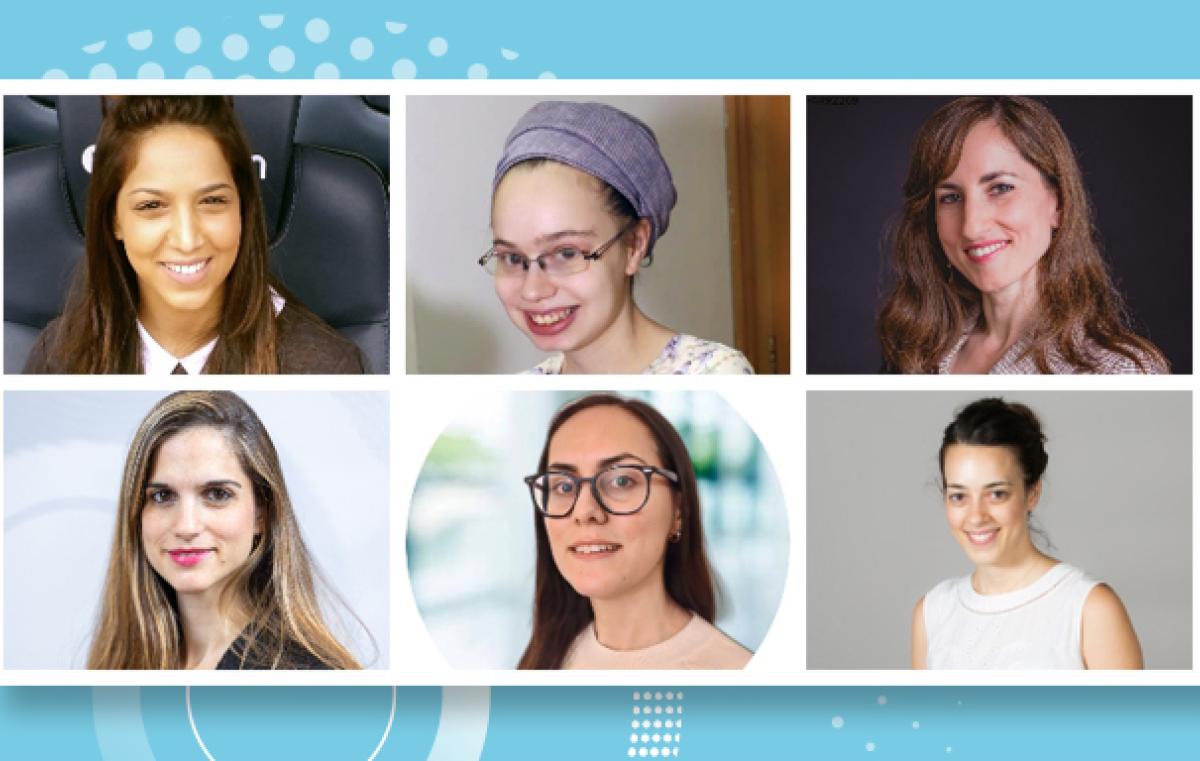Six Women Researchers Win Postdoctoral Fellowships in 2022
Bar-Ilan has increased the number of annual fellowships due to the candidates’ noted academic credentials

Each year, Bar-Ilan University awards three postdoctoral fellowships to women who have completed their doctoral degrees. This year, six promising young women researchers will receive the fellowships. The increase in the number of fellowships is a result of the high academic level of all the applicants. The fellowship aims to help brilliant women researchers overcome one of the significant barriers in the way of women being accepted as faculty members in academic institutions.
Prof. Orna Sasson-Levy, Advisor to the President of Bar-Ilan University on Gender Equity, explains why the university awards special fellowships to women, even though there are some additional scholarships for PhD graduates (both men and women) who are interested in pursuing postdoctoral research abroad:
“For many years, the Gender Equity Unit has been awarding postdoctoral fellowships designed to fund the women’s trips abroad. The fellowships are intended to help brilliant doctoral students overcome the main obstacle confronting women pursuing an academic career – the difficulty of traveling abroad for postdoctoral study. Postdoctoral research overseas is a prerequisite for obtaining an academic position. However, due to the typical family structure in Israel, where the man is the main breadwinner, it is more difficult for women to take the whole family abroad, sometimes for a period of four or even five years (in the STEM fields)."
"In an effort to underwrite women’s travel for their postdoctoral research, and thereby gradually change the gender structure of the academic staff, all Israeli universities – and Bar-Ilan included, as well as academic foundations and the Israel Council for Higher Education-Planning and Budgeting Committee – award special fellowships for women. The fellowship is conditional upon an invitation to a laboratory or research group at a prestigious university abroad.”
Prof. Sasson-Levy notes that even with the fellowship, the journey abroad for postdoctoral research is not easy. In the exact sciences, one travels to a postdoctoral fellowship for four years or more. The fellowship that Bar-Ilan grants is helpful, but is not sufficient, and the researchers who travel rely on other scholarships, such as from the Israel Science Foundation and the Rothschild Foundation. The unique fellowships for women are part of a policy aimed at encouraging women and increasing the ratio of women in academic faculty ranks, especially in the exact sciences, where there is an under-representation of women.
Prof. Sasson-Levy and Prof. Ronit Sarid, Dean of Bar-Ilan’s School of Graduate Studies, hold a postdoctoral preparatory meeting twice a year. The last meeting, which took place in May, was attended by 86 students.
These are the recipients of the postdoctoral fellowships awarded by Bar-Ilan’s Gender Equity Unit for 2022:
Dr. Anat Vivante of the Department of Physics: In her doctoral studies, Dr. Vivante investigated genome organization in living cells and the effect of various proteins on DNA dynamics. Genome organization in the nucleus is essential for cell function and gene control. Lack of organization directly impairs cell function and manifests itself in various diseases and syndromes. Therefore, the mechanisms responsible for the organization of chromosomes in defined territories, including the role of the structural proteins that take part in this organization, are an important research topic.
Dr. Karen Yirmiya of the Department of Psychology: Dr. Yirmiya seeks to identify the link between resilience and vulnerability factors in the development of psychopathology among children who are continuously exposed to terrorism, including hormones, immune system markers and parent-child relationship. Her doctoral dissertation is part of a longitudinal study comparing families from the Gaza envelope with those residing in other parts of Israel, and includes an assessment of the psychopathology of mothers and children, behavioral analysis of the interaction between them, and measurement of the hormones cortisol and oxytocin alongside immune system marker (s-IgA). Research findings highlight the importance of parenting style on the mental development of children living in a challenging security reality, as well as the ways in which parenting style affects the regulation of children's hormonal system.
Dr. Serena Shebsu of the Azrieli Faculty of Medicine in Safed: As part of her postdoctoral research, Dr. Shebsu is conducting research in the laboratory of Prof. Hans Clevers of the Hubrecht Institute in the Netherlands. In the study, the researchers use stem cells to create organoids (mini organs) in vitro to study which mechanisms control stem cell activity in health and illness.
Shilat Nachum of the Faculty of Education: In her doctoral research, Nachum examined the role of different types of flexibility in predicting and explaining the development of post-trauma and depression symptoms among different populations, including firefighters and civilians. The study findings highlight the importance of cognitive and emotional flexibility for optimal coping with traumatic events. In the postdoctoral research, Shilat seeks to identify behavioral and cerebral impairments in response to rewards among victims of childhood abuse and neglect using a variety of tools including fEMG, EEG and fMRI.
Shira Roth of the Kofkin Faculty of Engineering: As part of her doctoral research, Roth developed a rapid and sensitive method for identifying interactions between proteins. Identifying these interactions is of great importance for both basic and clinical research, as many proteins are involved in the development of various diseases. In her post-doctoral research, Shira will focus on the early non-invasive detection of diseases.
Tamar Bar-On of the Department of Mathematics: Bar-On is a researcher of theoretical mathematics in the field of algebra. She focuses mainly on profinite groups and simple algebras. These two structures are cornerstones in the field of circles and groups, and a powerful tool for understanding field expansions and Galois theory.